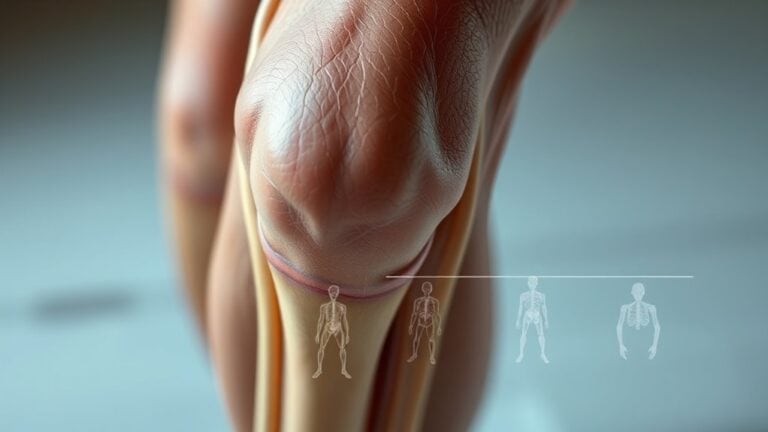Should you or someone you know has a tight cast, you may be pondering about the risks, especially regarding nerve damage. It’s easy to consider a cast as merely a solid piece of support, but in case it’s too tight, it can exert pressure on nerves and blood vessels. That’s why it’s essential to pay attention to warning signs. Eager to discover what symptoms to look for and how to care for a cast? Let us investigate this significant topic.
Understanding the Risks of a Tight Cast
Upon receiving a cast, it can feel like a necessary protection for your injury, but you may not realize that a tight cast can pose serious risks.
A tight cast can restrict blood circulation, threatening your limb’s health and delaying recovery. You could experience throbbing pain or skin discoloration, like pale or blue fingers, indicating increased pressure inside. This pressure can cause nerve damage, leading to numbness or weakness.
Beware of burning sensations; they signal trouble. Compartment syndrome could also develop, where swollen tissue harms nerves and blood vessels, risking irreversible damage.
It’s essential to monitor your cast fit regularly and seek immediate medical help when discomfort arises. Don’t hesitate; your health’s worth it!
Symptoms Indicating Nerve Compression
A tight cast could seem protective at the outset, but it can lead to concerning complications, especially regarding nerve compression.
Should you notice any of these symptoms, it’s essential to act quickly:
- Persistent pain that medication doesn’t relieve – a sign of increased pressure.
- Tingling in your hand or fingers, hinting at restricted blood flow.
- Discoloration of the skin, like paleness or blue tint, indicating poor circulation.
Ignoring these signs can lead to serious nerve damage.
You may also feel burning or stinging sensations under the cast, or experience difficulty moving fingers.
Should any of these symptoms occur, seek immediate medical attention to prevent further complications. Your comfort and healing should always come initially!
The Importance of Monitoring Blood Flow
While it could seem like a tight cast is doing its job, you need to be aware of how it can affect blood flow in your injured limb. A tight cast can compress blood vessels, leading to impaired circulation.
Watch for symptoms like skin discoloration—especially in case your skin looks pale or bluish. Swelling is another red flag; should you notice excessive swelling below the cast, it could be time to adjust its tightness.
Don’t forget to check capillary refill time; press on your nail bed, and in case color doesn’t return quickly, that’s a concern.
Keep in mind, prolonged pressure can lead to nerve damage and even tissue necrosis, so keeping an eye on blood flow is essential for your healing process.
When to Seek Medical Attention
Whenever you’re managing a tight cast, it’s crucial to pay attention to how your body feels. Understanding when to seek medical attention can make all the difference. Here are key symptoms to watch for:
- Persistent pain, especially in the event that it intensifies at night or during elevation.
- Changes in finger color, like paleness or a bluish tint.
- Numbness or tingling sensations that won’t go away.
These symptoms can indicate that pressure from the cast is affecting your nerves and blood flow.
Should you experience a burning sensation or find it hard to move your fingers or toes, don’t hesitate—get medical help right away. Your health is a priority, and timely evaluation can prevent complications or long-term damage.
Preventive Measures for Cast Care
Taking care of your cast is essential, especially at the time you want to avoid complications down the road. To prevent tightness and nerve damage, follow these simple tips:
| Tip | Details |
|---|---|
| Inspect the cast | Check for pain or numbness regularly. |
| Raise the injured limb | Keep it above heart level to reduce swelling. |
| Avoid tight clothing | Prevent added pressure on the skin around the cast. |
| Attend follow-up appointments | Get necessary adjustments to your cast. |
If you notice any issues, don’t hesitate to seek professional medical advice. Recall, itching is normal, but don’t insert objects into the cast. This proactive care will help guarantee your comfort and support healing.





